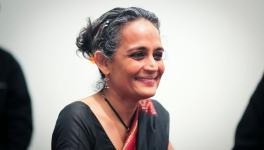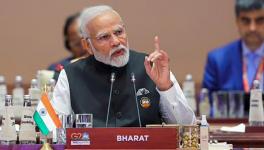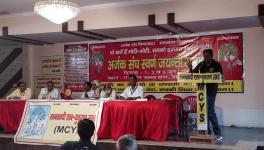Telangana’s Dalit -Adivasi Scholars Struggle to Access Overseas Scholarships
State governments and the Centre have been advancing scholarships to students from marginalised social groups so that they can pursue higher education abroad. There is tremendous enthusiasm among Scheduled Caste, Scheduled Tribe, minority and backward students for overseas education. These scholarships are meant to promote diversity and ensure equal opportunities for them. However, of late, instead of assisting students and facilitating their studies abroad, central policymakers and state governments are making these schemes exclusionary.
The budget allocation for higher education—especially for scholarship schemes and fellowship programs in public universities—was always frightfully low at the Centre and in the states. India’s knowledge-production systems, which have universities at their core, provide very few overseas opportunities for students. In this system, opportunities for students from SC and ST communities are almost negligible. Now states are giving their scholarship programs a more federal design, but they are limiting the access to these schemes.
The most recent overseas scholarship scheme announced by the Andhra Pradesh and Telangana governments (after amending the national scholarship program in some respects) seems to have sidelined social justice, which it claims as its primary goal. The authorities have adopted a very self-congratulatory and celebratory stand on the scheme in Telangana in particular, but the details of implementation do not justify the grand claims. Telangana’s scheme does not just provide inadequate assistance to the marginalised students, it even limits prospective applicant’s choice of country and institute to study in. The over-selective process denies marginalised students access to an array of opportunities which the privileged strata within India—and Indians abroad—can take for granted.
The result is that Telangana’s Ambedkar Overseas Vidya Nidhi Scheme for SC and ST Students has become an obvious exit gate for a majority of SC and ST scholars. This is because the bar for applying to the scholarship has been raised to 60% marks in the qualifying exams across disciplines, from pure sciences to humanities, engineering to agriculture sciences and nursing to management. This is a serious concern, for it can render a large chunk of the scholar fraternity ineligible to even apply for overseas scholarships.
There is a reason why the pass-out rate of SC and ST students at the graduate level is not high. The culture that prevails in academic spaces is the biggest contributor to this situation, as the All-India Report on Higher Education, a survey of the Ministry of Human Resource Development also shows: in 2018-19 SCs made up 14.9% and STs only 5.5% of total enrolment (or Gross Enrolment Ratio) in higher education institutes. Numerous testimonies and research papers show how in graduate colleges a primary reason for the high dropout rate of SC/STs is the caste-based discrimination and exclusion.
Students across castes and communities enrol in schools in roughly the same numbers, but Dalit and tribal students account for the highest number of dropouts. Among Dalits, the share of school students drops from 81% in the 6-14 years age group to 60% in the 15-19 years age group. It plummets further to just 11% in the 20-24 age group in higher education. Given this social disability, the marginalised sections have to strive for a basic degree. To make the scholarship scheme more accessible and inclusive, Telangana must return to the 55% cut-off mark for the qualifying examination. (The central Ministry of Social Justice has revised the cut-off from 55% to 60% this year and so has the Telangana government. In united Andhra Pradesh, since 2013, the cut-off had been 60%.)
Second, the amount being awarded by Telangana is palpably insufficient to meet the requirements of students going abroad to study. A grant of Rs.20 lakh would be awarded to selected candidates and released in instalments towards “living and tuition fees” (which is a hike from the previous sum of Rs.10 lakh but still insufficient). The monetary burden of students from the SC/ST sections is not taken into account even by this newly-announced scheme. Expenditure on applications, admissions and the examination process is quite high, which the new policy does not address.
It is the state’s evidently superficial understanding of caste as a social category that reflects in how it has designed this scheme. The inadequacy of the grant had pushed many SC/ST students to take up odd jobs while they study abroad. It is not that students do not work when they are studying overseas, but for the SC/ST students work becomes a compulsion. This must concern the governments that award grants for both “living and tuition fees”.
Taking on a heavy debt for education versus a rightful scholarship are very different circumstances and can change the quality of research that a scholar can undertake. Having no choice but to work also denies the marginalised students a better quality of life in future than most other job-seekers. Loans secured for educational purposes have always been counterproductive, though a few state-owned banks offer lower rates of interest and authorities attempt to ease the process of taking out loans. However, the harsh reality is that seeking a loan is always discriminatory to landless SC and ST students, who are denied loans because land or other immovable property has to be offered as collateral for loans over Rs.7.5 lakh.
In addition, when students relocate to a culturally alien region in which they completely lack social or cultural capital they need a decent amount of time to cope with their new conditions. This affects the scholars from marginalised communities more. After all, they have to start working for their sustenance immediately on arrival. Making a living while studying—and remember that casteism prevails abroad too—has pushed a good number of students (familiar to the writers) to take up menial jobs. This has adversely affected the quality of their education and research as well as their living conditions. This environment has led many to drop out from prestigious universities abroad.
The demanding set up of overseas universities is made even more challenging when states (such as Maharashtra) fail to clear the promised dues of the universities abroad. This has led many Dalit students (some of whom the authors are familiar with but who do not want to be identified) to drop out after failing to clear their dues on time. Withdrawing from an international scholarship is obviously a cause of serious concern to any scholar. If the withdrawal is a result of delays in releasing funds by the central and state ministries, the outcome is far worse. It has naturally triggered mental health issues among the scholarship holders. Some scholars we spoke to called it an “international humiliation” but we call it international casteism since dropping out of a top university for students who have social and cultural capital is not the same as when SC or ST students drop out.
Being unable to pay academic dues is one of the worst forms of humiliation for a student in the academic space, but several scholars we spoke to have had to go through it in recent months. The burden of reaching out to the Indian embassies and ministries to sort out the issues—a tedious and often futile task—also falls on the student in these circumstances.
Casteism beyond India’s borders has been denied for a long enough time. But international casteism, like racism, is being reported regularly from other nations. Of late, SC and ST students have pointed out several such incidents of discrimination based on caste. Especially for the first generation among the SC and ST communities who are abroad, this struggle is excruciating.
Finally, the Telangana government has picked ten countries whose top universities alone qualify for students seeking scholarships to study abroad. In this way, no real choice has been left to the SC, ST, Backward Class and minority students. Anyone keen to pursue a course, even one that is reputed, but from a country not listed in the government’s scheme, is simply denied access to a scholarship. The government needs to make the scheme more global-friendly, while in the interest of students it can certainly make background checks on the sought-after institutions more stringent.
Bridging the lack of social communication plays a vital role in dealing with casteism. To tackle such social and legal wrongs, state governments must establish exclusive grievance cells to take up complaints from SC and ST students. The grievance department must deal with all kinds of delays in the release of scholarship grants effectively so that students are not pushed out of universities. Embassies must be asked to officially coordinate with the Indian government on these issues.
Ashok Danavath is a graduate from Tata Institute of Social Sciences, Hyderabad and Sanjeev Gumpenapalli is a law student at NALSAR, Hyderabad. The views are personal.
Get the latest reports & analysis with people's perspective on Protests, movements & deep analytical videos, discussions of the current affairs in your Telegram app. Subscribe to NewsClick's Telegram channel & get Real-Time updates on stories, as they get published on our website.
























